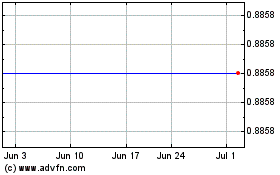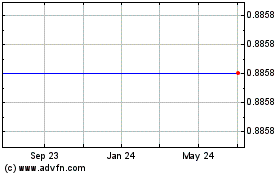By Max Colchester and Margot Patrick
Six months ago, Russian power-to-aluminum company En+ Group PLC
listed on the London Stock Exchange, cheered on by a former U.K.
government minister and a cluster of big name banks.
Today, many of those banks are racing to disentangle themselves
from En+ as the effects of the latest wave of U.S. sanctions sweeps
across the global finance industry.
EN+, its aluminum-producing unit United Co. Rusal and their
owner Oleg Deripaska were placed on a list sanctioning dozens of
Russian individuals and entities last Friday.
Banks including Citigroup Inc. and Credit Suisse Group AG are
now shedding ties to the group, according to people familiar with
the matter. Other financial services companies are rushing to
distance themselves, with ratings firms Moody's Investors Service
and Fitch Ratings removing their ratings for Rusal and the London
Metal Exchange saying it won't stock its metal.
The flurry of activity points to the deep reach of this round of
sanctions and the potential ramifications for both U.S. and
non-U.S. financial firms that do business with those on the
list.
"This is uncharted territory," said Tom Cummins, a partner in
London at law firm Ashurst.
Never before have individuals been targeted that are so
"integrated into commodities, global markets and international
trade," he added.
The sanctions don't just entangle U.S. banks.
Non-U.S. banks or companies can face sanctions if they undertake
"significant transactions" involving those named on the list. Many
say they will err on the side of caution by following the strictest
version of the rules across their businesses, to avoid the risk of
losing access to the U.S. financial system.
Compliance teams are scouring their client lists to work out
exposure to subsidiaries and affiliates of the sanctioned groups,
bankers say, some of which have local operations in countries such
as Switzerland and Italy. Several European lenders gave Rusal
credit lines and upfront funding for metal sales.
The sanctions also have sparked wider caution about dealing with
or owning the assets of any individual or company with ties to the
Kremlin, for fear that Washington could expand the list. That fear
has roiled markets, leading to a selloff of the ruble, Russian debt
and many of the country's biggest companies.
Banks have two deadlines, in May and June, to wind down existing
business with the sanctioned entities. U.S. officials are touring
Europe to warn banks not to flout the sanctions and to cut ties to
Russian individuals and entities if they want continued access to
U.S. banks.
"There of course would be consequences for U.K. financial
institutions and any activity that is going through the U.S.,"
Sigal Mandelker, U.S. Under Secretary of the Treasury for Terrorism
and Financial Intelligence, told reporters in a briefing.
The new sanctions regime particularly could hurt London, where
rich Russians are deeply embedded, basing businesses, snapping up
stakes in soccer teams and buying up swaths of the capital's most
costly real estate. Demand for property in the capital's Mayfair
district already has cooled and is expected to continue to fall,
estate agents said.
Global banks, often from London, have helped Russian companies
list, issue bonds and have lent them money. Last year, for
instance, Russian companies raised $14.6 billion in syndicated
loans, according to data from Thomson Reuters LPC. They have raised
$1.7 billion so far this year. Such loans are made from banks to
companies and then parceled out to other banks and investors.
The U.S. has long used its economic sway and control over dollar
clearing to squeeze adversaries. In the last decade, U.S.
authorities slapped foreign banks with multibillion-dollar fines
for failing to comply with U.S. sanctions, a move that triggered
those banks to exit swaths of the Middle East and South America
while shedding thousands of clients they considered too risky.
The action against Russian entities turns the heat up further,
experts say. Some say that banks and investors have yet to truly
realize how disruptive these sanctions could be. They effectively
place some major industrial companies on the same legal status as
Iranian entities involved in weapons proliferation, or with drug
traffickers.
For a bank, not dealing with Iran is easier than avoiding a
global aluminum business or other major Russian commodities player.
Commodities are almost all priced in dollars, while banks also lend
to big buyers of oil and metals.
En+ is a case in point. The group listed on the London Stock
Exchange in November 2017, raising $1.5 billion, with Citigroup,
Credit Suisse and France's Société Générale SA among the western
banks taking lead roles. The listing was cheered as a symbol of
thawing investor sentiment to Russian companies after the European
Union and U.S. filed sanctions against Moscow in 2014.
The former British climate change minister Gregory Barker -- who
now sits in the House of Lords -- was brought in to chair the
company. The board later expanded with Dominique Fraisse, head of
natural resources at French bank Natixis, among those joining. In
January, En+ announced corporate brokers Citigroup and Credit
Suisse would work with its new enlarged shareholder base. That same
month, Rusal issued a $500 million bond, assisted by the two banks
and others including JPMorgan.
A spokesman for Société Générale said the bank strictly complies
with international sanctions.
Mr. Barker and En+ didn't return calls for comment. A
spokeswoman for Natixis didn't respond to a request for comment. A
JPMorgan spokeswoman declined to comment.
Now investors have until May 7 to sell or transfer debt, equity,
or other holdings in En+.
The impact has been swift. Clearing house LCH Ltd. said this
week it will no longer clear shares of Rusal or EN+ Group, and
index provider FTSE Russell said Rusal and EN+ Group would be
removed from FTSE indexes on Friday. The holding company is
hemorrhaging board members, with Mr. Fraisse exiting. Citi and
Credit Suisse have quit as corporate brokers, according to people
familiar with the matter. En+ Group global depository receipts in
London lost half their value before being suspended from trading
Monday.
Other sanctioned companies looking to raise money in Europe have
had to change plans. This week, Citigroup and Goldman Sachs Group
Inc. stopped working on a planned initial public offering for
Italian data services company Octo Telematics, people familiar with
the transaction said. The company's indirect controlling
shareholder, Viktor Vekselberg, is on the sanctions list.
Write to Max Colchester at max.colchester@wsj.com and Margot
Patrick at margot.patrick@wsj.com
(END) Dow Jones Newswires
April 12, 2018 14:15 ET (18:15 GMT)
Copyright (c) 2018 Dow Jones & Company, Inc.
Credit Suisse (NYSE:CS)
Historical Stock Chart
From Mar 2024 to Apr 2024

Credit Suisse (NYSE:CS)
Historical Stock Chart
From Apr 2023 to Apr 2024
